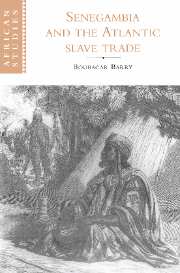Book contents
- Frontmatter
- Contents
- Preface
- Map
- I Senegambia from the fifteenth to the seventeenth century: a haven for incoming populations, a station for migrants on the move
- II Senegambia in the eighteenth century: the slave trade, ceddo regimes and Muslim revolutions
- III Senegambia in the first half of the nineteenth century: legitimate trade and sovereignty disputes
- IV Senegambia in the second half of the nineteenth century: colonial conquest and resistance movements
- 14 Colonial imperialism and European rivalries in Senegambia
- 15 Last-ditch resistance movements of legitimist rulers in northern Senegambia
- 16 The conquest of the Southern Rivers region
- 17 The balancing act of the Almamis of Timbo in their attempts to cope with centrifugal forces
- 18 Bokar Biro and the conquest of Futa Jallon
- 19 Mass resistance movements among the Joola and the Konyagi
- Conclusion
- Notes
- Bibliography
- Index
- Other books in the series
16 - The conquest of the Southern Rivers region
Published online by Cambridge University Press: 31 October 2009
- Frontmatter
- Contents
- Preface
- Map
- I Senegambia from the fifteenth to the seventeenth century: a haven for incoming populations, a station for migrants on the move
- II Senegambia in the eighteenth century: the slave trade, ceddo regimes and Muslim revolutions
- III Senegambia in the first half of the nineteenth century: legitimate trade and sovereignty disputes
- IV Senegambia in the second half of the nineteenth century: colonial conquest and resistance movements
- 14 Colonial imperialism and European rivalries in Senegambia
- 15 Last-ditch resistance movements of legitimist rulers in northern Senegambia
- 16 The conquest of the Southern Rivers region
- 17 The balancing act of the Almamis of Timbo in their attempts to cope with centrifugal forces
- 18 Bokar Biro and the conquest of Futa Jallon
- 19 Mass resistance movements among the Joola and the Konyagi
- Conclusion
- Notes
- Bibliography
- Index
- Other books in the series
Summary
The conquest of the Southern Rivers region in southern Senegambia was a later and much more complex development than that of northern Senegambia. The main reason was the competition between France, Britain, and Portugal for control of the region. A further complicating factor was the interaction between the process of European colonial conquest and the expansion of the Futa Jallon kingdom into the Southern Rivers area, which at the time was undergoing profound political and social upheavals from Gambia all the way to Sierra Leone.
The drive to conquer the Southern Rivers region speeded up after the 1880s partly because France had steadily occupied northern Senegambia and the Sudan, and partly because various European powers were engaged in a race to carve up Africa.
Britain held on doggedly to its possessions along the Gambia River. In so doing, it hoped to keep the strategic advantage offered by this trading corridor along which it might also be possible to thrust into the Sudan on a mission of conquest. Furthermore, Britain wished to secure communications between Gambia and Sierra Leone through Futa Jallon and the Southern Rivers region. For these reasons, Britain countered all French efforts to negotiate an exchange of the Gambia for selected French possessions in Africa or elsewhere.
For obvious economic reasons, as well as from motives of national prestige, Portugal also held on grimly to its possessions in Rio Geba, Rio Cacheu, and Rio Kasini, subsequently using them as a basis for the colony of Guinea Bissao.
- Type
- Chapter
- Information
- Senegambia and the Atlantic Slave Trade , pp. 243 - 262Publisher: Cambridge University PressPrint publication year: 1997



